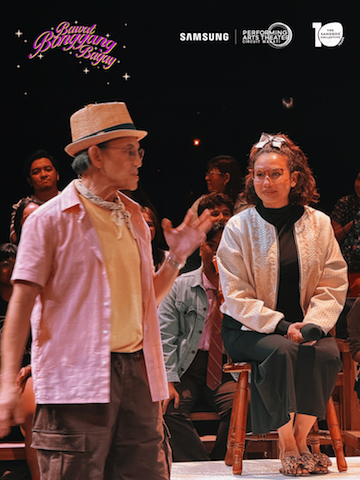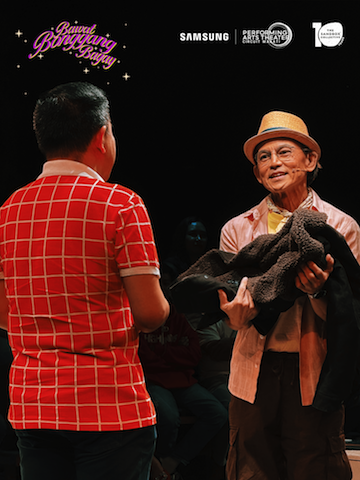
REVIEW: ‘Bawat Bonggang Bagay’s rerun chooses to highlight finding joy above all else
Guelan Luarca’s Filipino translation of ‘Every Brilliant Thing’ starring Jon Santos was a highly entertaining evening at the theater, with a message worth sharing to as many people it can reach.
Much acclaimed for using his keen intelligence and finely honed artistry not only for laughs, but for socially relevant (and often political) purpose, Jon Santos understands that humor is one of the most powerful weapons in art’s arsenal. He shows this with much aplomb in Bawat Bonggang Bagay, Guelan Luarca’s Filipino translation of Duncan Macmillan’s Every Brilliant Thing– a production packaged so delightfully, the educational and life-affirming point of the play comes across powerfully.
The Playfulness of Improv
In Bawat Bonggang Bagay, there’s a sense that what the actor has on hand is more of a suggested outline rather than Holy Writ. Lengthy monologues by the Narrator were broken by a lot of lines given to five random audience members (with varying degrees of shyness and commitment). But with Jon Santos at the helm, even the most bashful volunteer felt comfortable. Santos, the virtuoso performer, was splendidly at ease with all the little quirks that come from unrehearsed audience interactions. And when he called for a noontime-show-Pinoy-style wave, we all stood and undulated on cue, as if we had been rehearsing forever, so closely attuned were we to our conductor (and to each other).
He’s Making A List
Santos spent most of the evening clutching a pencil and paper for a special list. When we think about how we make lists as a frail attempt to wrestle a bit of control over a chaotic and unpredictable universe, we understand his nearly obsessive drive to keep enumerating a list of bongga things that bring the Narrator joy (Lily’s coco jam, Baguio strawberries, etc.). And yes, as the show reminds us, the word bongga is now in the Oxford English Dictionary.
The list contains all that is good and beautiful, that make him glad to be alive in a world that contains them.

Jon Santos calls Karylle Tatlonghari from the audience; Photo Credit: @thesandboxco.labs, @cpatofficial
At first, the list is not for him. It’s for his mother, who first attempted suicide when he was just a schoolboy. This is his way to make his mom see the beauty in the world, which his mother saw very differently.
The boy grows into manhood, and the list grows with him through college flirtation and the stresses of marriage, past the most meaningful moments and the darkest of Life’s despairs. Will our protagonist’s numbered list make it to a million? It took a hundred minutes to find out, but we didn’t feel time’s passing at all.
Potentially Life-Saving Message
All the hilarity had the effect of lowering our guards, so when Santos spoke his message in the kindest and warmest tones we heard all evening, I really felt them as if straight from his heart to mine. If anyone in the audience is entertaining ideas of self-harm, he said, please don’t. Things will get better. “Ang mga bagay nagbabago,” he urged.
As the lights shone brightly when Santos addressed the audience as his support group, he reminds us of the importance of a phone call, because it helps to share things. That it’s so important to be seen, to hear people say “I remember you,” as well as “I love you.” And we realize that this was the purpose of the theater-in-the-round seating arrangement: to recreate a therapy group.
But the play goes on to show that, in the same way that we have the power to help simply by listening to other hurting human beings, we also have the power of agency, of choosing to see joy in all things.
Awakening the Joyful Child in All of Us

Jon Santos calls in an audience member; Photo Credit: @thesandboxco.labs, @cpatofficial
Handling explosive topics requires the utmost delicacy, especially when we are taught not to laugh at death and despair for fear of trivializing them. But Director Jenny Jamora managed to find a take that acknowledged this weight and yet didn’t cripple the audience with ‘trauma dumping’. And with Santos, one felt that he didn’t want us to leave without having a darn good time. And so we all did.
Things hit differently when uttered in the audience’s mother tongue. Guelan Luarca’s Filipino translation didn’t just provide Filipino noun equivalents; it brought the play so much closer to home, adding a new layer to the same-sex marriage of the Narrator (who, in the play, had to fly all the way to Toronto, as Philippine law discriminates against marriage equality).
Mark Dalacat’s set design shows he can do so much with so little space, as the set and all the audience members were on CPAT’s stage. With a few wooden cabinets and shelves, we transitioned seamlessly from car interiors to libraries, classrooms and homes. The walk backstage was also memorable in its own right, shrouding the whole affair with a tinge of exclusivity.
Sound design by Arvy Dimaculangan was most helpful, as the younger members of the audience did not always know the songs that the Narrator was referencing. Kiefer Sison’s lights, while simple, were impeccably timed with a most memorable blackout during a kissing scene.
Joy is a choice, the play reminds us. And the play’s embracing of it was part of this message, making it a very bongga night at the theater indeed.
Tickets: P1,620 – P2,160
Show Dates: June 22 – 30, 2024 (3:00 PM / 7:30 PM)
Venue: Samsung Performing Arts Theater (Stage), Circuit Makati
Running Time: 100 minutes (no intermission)
Credits: Duncan MacMillan and Jonny Donahoe (Playwrights), Guelan Luarca (Filipino Translator), Jenny Jamora (Director), Arvy Dimaculangan (Sound Designer), Kiefer Sison (Lighting Designer), Mark Dalacat (Set Designer), Krystal Kane (Costume Stylist)
Cast: Jon Santos (The Narrator) and random audience members
Company: The Sandbox Collective


Comments